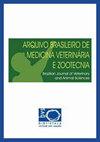在马的心肺/镇静作用比较在蛇毒中鉴定的肽乙酰丙嗪和噻嗪
IF 0.5
4区 农林科学
Q4 VETERINARY SCIENCES
Arquivo Brasileiro De Medicina Veterinaria E Zootecnia
Pub Date : 2023-07-01
DOI:10.1590/1678-4162-12821
引用次数: 0
摘要
本研究的目的是研究静脉注射克罗酞碱是否对健康站立的马产生显著的镇静作用以及生理变化。6匹8岁、体重415kg的母马采用交叉设计,分别静脉注射TA(乙酰丙嗪:50μg.kg-1)、TC (crotalphine: 0.01μg.kg-1)和TX (xylazine: 1000μg.kg-1)。在60分钟内的不同时间点,记录生理变量:心率、呼吸频率和直肠温度。头距地面高度(HHG)以厘米为单位进行评估。数据分析采用方差分析加Dunnett检验或Friedman加Dunn检验,显著性在5%以下。与Mb相比,M5和M10的心率分别显著降低(28±7、26±6和40±8次/分钟-1);p = 0.0004)。呼吸频率和直肠温度在组间和时间点间无差异。与Mb相比,各时间点各组HHG均显著降低(p<0.0001)。综上所示,crotalphine不能对健康站立的母马产生可靠和持久的镇静作用,也不会以临床相关的方式影响心肺变量。本文章由计算机程序翻译,如有差异,请以英文原文为准。
Cardiorespiratory/sedative effects of a peptide identified in crotalic venom compared to acepromazine and xylazine in horses
ABSTRACT The purpose of this study was to investigate whether intravenous crotalphine produces significant sedation, as well as physiological changes, in healthy standing horses. Six mares, aged 8 years and weighing 415kg underwent three different treatments in a crossover design: TA (acepromazine: 50μg.kg-1), TC (crotalphine: 0.01μg.kg-1) and TX (xylazine: 1000μg.kg-1), intravenously. At various time points over 60 minutes, physiologic variables were recorded: heart rate, respiratory rate, and rectal temperature. The head height from the ground (HHG) was evaluated in centimeters. Data were analyzed using ANOVA followed by Dunnett’s test or Friedman followed by Dunn’s test, under 5% significance. Heart rate decreased significantly at M5 and M10 compared with Mb in TX (28±7, 26±6 and 40±8 beats/minute-1, respectively; p=0.0004). Respiratory rate and rectal temperature did not differ among groups or time points. The HHG significantly decreased in all groups compared with Mb at various time points (p<0.0001). In conclusion, crotalphine did not produce reliable and durable sedation in healthy standing mares and did not influence cardiorespiratory variables in a clinically relevant manner.
求助全文
通过发布文献求助,成功后即可免费获取论文全文。
去求助
来源期刊
CiteScore
0.80
自引率
25.00%
发文量
111
审稿时长
9-18 weeks
期刊介绍:
Publica artigos originais de pesquisa sobre temas de medicina veterinária, zootecnia, tecnologia e inspeção de produtos de origem animal e áreas afins relacionadas com a produção animal. Atualmente a revista mantém 628 permutas (419 internacionais e 209 nacionais), sendo um verdadeiro suporte para o recebimento de periódicos pela Biblioteca da Escola.
A partir de 1999, a Escola de Veterinária delegou à FEP MVZ Editora o encargo do gerenciamento e edição de todas suas publicações, inclusive do Arquivo, ficando somente com o apoio logístico (instalações, equipamentos, pessoal etc.). O apoio financeiro é exercido pelo CNPq/FINEP e pela própria FEP MVZ.

 求助内容:
求助内容: 应助结果提醒方式:
应助结果提醒方式:


